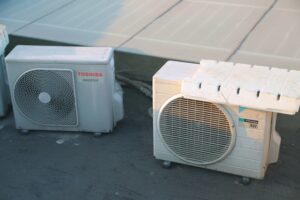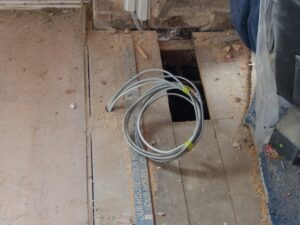If you’re a homeowner, you likely understand the importance of maintaining your home’s water quality. One way to ensure the water you and your family use is clean and safe is by installing a whole house water filter. But how often should you replace this filter to make sure it’s doing its job effectively?
We recommend replacing your whole house water filter at least once a year. However, the frequency of replacement can vary depending on factors such as the quality of your water and the type of filter you have installed. For example, if you have a pre-filter, you may need to replace it every 3 to 9 months, while a post-filter may need to be replaced every 6 to 12 months.
Regular maintenance of your whole house water filter is crucial to ensure it continues to function properly. Neglecting to replace your filter can result in a buildup of contaminants, which can negatively impact your water quality and potentially harm your health. Here at Excel Mechanical, we offer top-notch maintenance services to keep your whole house water filter in excellent condition. Our team of professionals is dedicated to providing exceptional quality and value for both residential and commercial HVAC and plumbing services.
Understanding Whole House Water Filters
If you’re looking to improve the quality of your home’s water supply, a whole house water filter is a great option to consider. These filters are designed to remove impurities and contaminants from your water supply, providing you with cleaner, safer, and better-tasting water. In this section, we will explore the types of whole house water filters, how they work, and the benefits of using them.
Types of Whole House Water Filters
There are several types of whole house water filters available on the market, including sediment filters, carbon filters, and UV filters. Sediment filters are designed to remove dirt, sand, and other particles from your water supply. Meanwhile, carbon filters use activated carbon to remove impurities such as chlorine, pesticides, and other chemicals. Lastly, UV filters use ultraviolet light to kill bacteria and other microorganisms in your water supply.
How Whole House Water Filters Work
Whole house water filters are installed at the point where water enters your home. The water flows through the filter, which removes impurities and contaminants. The filtered water then flows through your home’s plumbing system, providing you with clean, safe water at every tap.
Benefits of Whole House Water Filtration
There are many benefits to using a whole house water filter. First and foremost, they provide you with cleaner, safer, and better-tasting water. They also help to protect your home’s plumbing system from damage caused by impurities and contaminants. Using a whole house water filter can also help to reduce the amount of soap and detergent needed for cleaning, as well as the amount of bottled water you need to purchase.
When to Replace Your Water Filter
If you are wondering when to replace your water filter, there are a few factors to consider. In this section, we will discuss signs of a worn-out filter, the average filter lifespan, and factors affecting filter replacement frequency.
Signs of a Worn Out Filter
One of the most obvious signs that your water filter needs to be replaced is a decrease in water pressure. If you notice a drop in water pressure, it may be due to sediment buildup in the filter. Another sign of a worn-out filter is a change in the taste or odor of your water. This could be an indication that the filter is no longer effectively removing contaminants from your water.
Average Filter Lifespan
The average lifespan of a whole-house water filter varies depending on the filter type and usage. According to The Spruce, pre-filters should be replaced every 3 to 9 months, post-filters every 6 to 12 months, and filtration tanks every 5 to 10 years. UV filters (lamp) should be replaced as needed, about once a year. However, the frequency of replacement can vary based on factors such as water quality, usage, and the type of filter.
Factors Affecting Filter Replacement Frequency
The frequency of filter replacement can depend on various factors. For instance, if you have a large household, you may need to replace your filter more frequently. Similarly, if your water supply contains a high level of sediment or other contaminants, your filter may need to be replaced more often. Additionally, the type of filter you have installed can also impact its lifespan.
Replacing Your Water Filter: A Step-by-Step Guide
If you have a whole house water filter system, it’s important to replace the filter regularly to ensure that it continues to function effectively. In this section, we’ll provide you with a step-by-step guide to replacing your water filter.
Determining the Right Filter
Before you replace your water filter, you need to make sure that you have the right replacement filter. There are many different types of filters available, and the one you need will depend on the specific make and model of your filtration system.
You can consult the manufacturer’s instructions to find out which filter you need, or you can contact a plumber or a professional HVAC and plumbing service like us to help you determine the right filter for your system.
Steps for Filter Replacement
Once you have the right replacement filter, you can begin the process of replacing your old filter. Here are the steps you should follow:
- Turn off the water supply to your filtration system.
- Locate the pressure release button on the filter housing and press it to release any built-up pressure.
- Use a filter wrench to loosen the filter housing and remove the old filter.
- Clean the filter housing and the O-ring to remove any dirt or debris.
- Insert the new filter into the housing and tighten the housing with the filter wrench.
- Turn the water supply back on and check for any leaks.
Ensuring Proper Installation
It’s important to ensure that your new filter is installed properly to ensure that it functions effectively. If you’re not comfortable replacing the filter yourself, you can contact a plumber or a professional HVAC and plumbing service to help you with the installation.
We are professionals who strive for exceptional quality and great value. We work to provide the best possible system to meet individual needs and budget. We are the best option for HVAC and plumbing services for both residential and commercial.
Maintenance for Optimal Performance
Regular maintenance is crucial for ensuring that your whole house water filter continues to work effectively and efficiently. By following a few simple maintenance steps, you can prolong the lifespan of your filter and ensure that your water is always clean and safe to drink.
Regular Inspection and Cleaning
Regular inspection and cleaning of your whole house water filter is essential for maintaining optimal performance. You should inspect your filter at least once a month to ensure that it is working correctly.
Check for any signs of damage, such as cracks or leaks, and clean the filter housing to remove any dirt or debris that may have accumulated.
Preventing Mold and Bacteria Buildup
Mold and bacteria can build up in your whole house water filter over time, leading to unpleasant odors and potential health risks. To prevent this from happening, you need to regularly clean and disinfect your filter.
You can do this by using a mixture of water and vinegar to clean the housing and filter cartridge.
Setting Up Replacement Reminders
It is important to replace your whole house water filter cartridge on a regular basis to ensure that it continues to work effectively. However, it can be easy to forget when it is time to replace the cartridge. To avoid this, consider setting up replacement reminders.
You can do this by marking the replacement date on your calendar or setting a reminder on your phone.
Factors Influencing Water Filter Efficacy
When it comes to replacing your whole house water filter, several factors can affect the efficacy of your filtration system. Understanding these factors can help you determine when it’s time to replace your filter.
Water Source and Contaminant Levels
The quality of your water source and the level of contaminants it contains can significantly impact the lifespan of your filter. If your water source is heavily contaminated with sediment, heavy metals, or other pollutants, your filter may need to be replaced more frequently. It is essential to monitor your water source and test it regularly to determine the level of contaminants present.
Household Water Usage Patterns
The amount of water your household uses can also impact how often you need to replace your filter. If you have a large family or use a lot of water, your filter may need to be replaced more frequently. On the other hand, if you have a small family or use less water, your filter may last longer.
Impact of Hard Water on Filters
Another factor that can affect the lifespan of your filter is hard water. Hard water contains high levels of minerals such as calcium and magnesium, which can cause buildup and reduce the effectiveness of your filter. If you have hard water, you may need to replace your filter more frequently.




